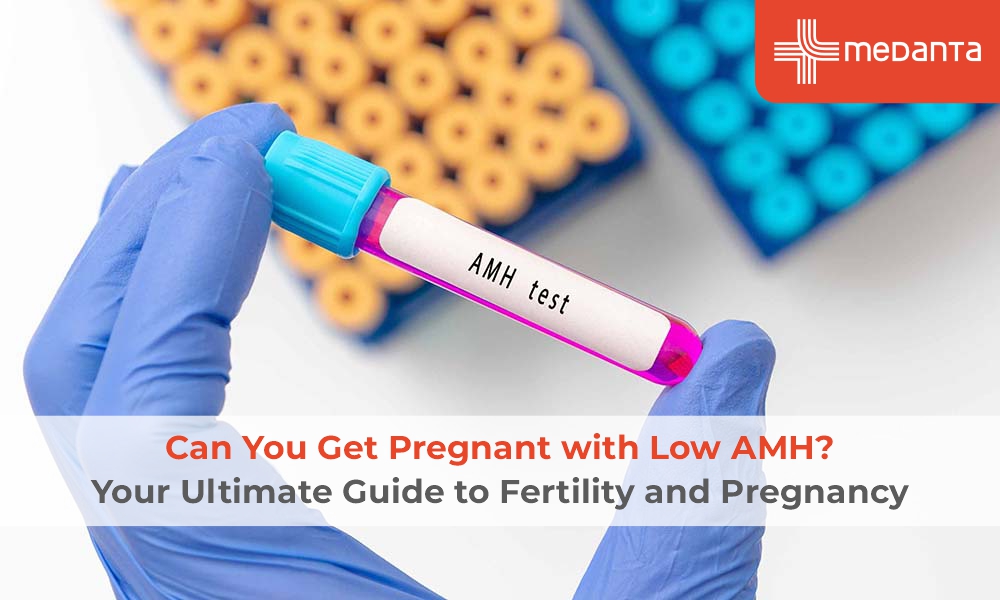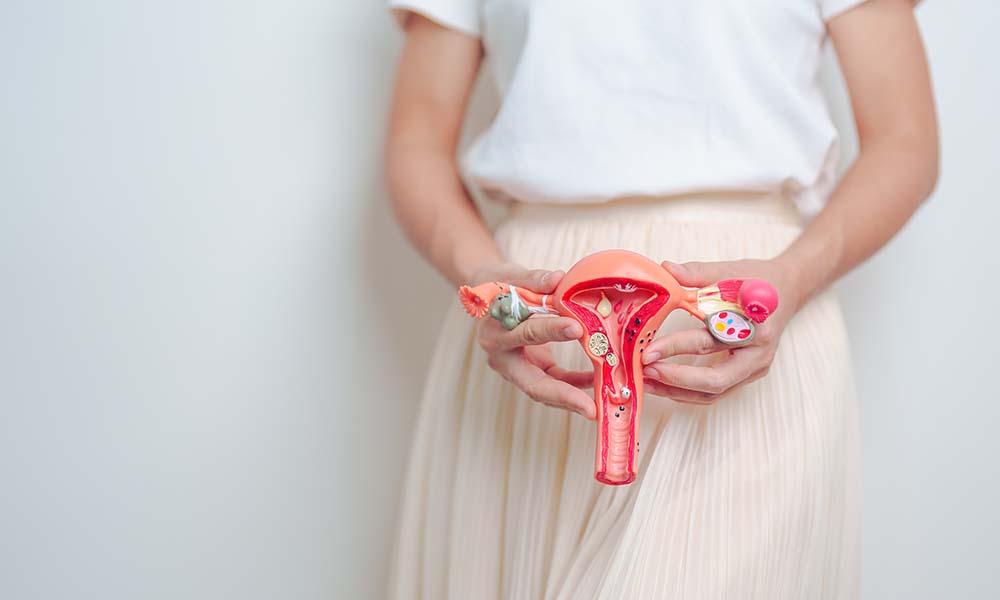Can You Get Pregnant with Low AMH? Your Ultimate Guide to Fertility and Pregnancy

TABLE OF CONTENTS
If you find that you have low AMH, the fear of not being able to get pregnant is natural. Anti-Müllerian Hormone (AMH) is one of the most important fertility markers, but not the only one. The success stories of the majority of women are evidence that low AMH and natural pregnancy are still very possible.
So, what exactly is AMH and pregnancy? How does it affect your fertility? And most importantly, can you still get pregnant naturally or through treatments? This blog will discuss all of that in detail.
What is AMH?
AMH (Anti-Müllerian Hormone) is a hormone secreted by your ovaries' small follicles. It is used to predict your egg reserve, i.e., how many eggs you have. A high AMH level indicates good ovarian reserve, and a low AMH indicates fewer eggs.
The following is a rough mapping of AMH value for pregnancy (in ng/mL):
High AMH: Over 4.0 (also typically associated with PCOS as well)
Normal AMH: 1.5 – 4.0
Low AMH: 0.5 – 1.5
Very Low AMH: Below 0.5
But here's the thing: AMH doesn't show egg quality. You can have fewer eggs with low AMH, but they can be healthy and great for conception.
Why Do Some Women Have Low AMH?
A low AMH level for pregnancy can be caused by numerous reasons. While age is the most frequent reason, environmental, biological, and lifestyle reasons can be involved as well. Let us discuss further:
1. Age and Ovarian Reserve
Women are born with all the eggs they will ever have—around 1 to 2 million at birth. This number dwindles to about 300,000 to 400,000 at puberty. As every menstrual cycle comes and goes, a new crop of eggs is brought out, but just one (sometimes more) reaches maturity and is shed at ovulation. As years pass, natural pregnancy causes levels of AMH to decline.
The majority of women are left with about 12% of their initial egg count at age 30.
At 40 years old, it drops to about 3%, making it harder to conceive.
AMH value for pregnancy is related to ovarian reserve; therefore, naturally, older women are noted to have lower levels.
2. Family History and Genetics
Some women are born with a genetic condition and have low levels of AMH, and their egg reserve depletes faster than normal. If your mom or sister experienced premature menopause or difficulty conceiving, then you, too, might have a naturally lower level of AMH for pregnancy.
3. Autoimmune Disorders
Autoimmune illnesses like thyroid illness, lupus, or rheumatoid arthritis may create inflammation that produces harmful effects on the function of the ovaries. The immune system, in some instances, attacks the ovarian tissue inappropriately, causing low levels of AMH.
4. Endometriosis
Endometriosis refers to when the uterine lining tissue develops elsewhere outside of the uterus and causes scarring and inflammation of the ovaries. Patients suffering from endometriosis experience quicker depreciation in their AMH value for pregnancy as their ovarian reserve is compromised.
5. PCOS and Hormonal Imbalance

Surprisingly, women with PCOS contain more AMH than average due to their ovaries overproducing immature follicles. In some cases, though, PCOS hormonal abnormalities result in malfunctioning ovaries and decreased levels of AMH for conception in the long term.
6. Chronic Stress and Cortisol Levels
Chronic stress increases cortisol, a hormone that can interfere with reproductive function. Chronic stress is linked with hormonal imbalance, irregular ovulation, and damaged egg quality, which might indirectly lead to lower AMH levels.
Can You Get Pregnant Naturally with Low AMH?
Yes, you can! Low AMH and natural pregnancy can be more challenging but not impossible. Here's why:
You Still Ovulate—Even if your AMH is low, you only need one good egg to conceive.
Egg Quality Matters More—While AMH is about quantity, egg quality dictates pregnancy success.
Regular Cycles Help—If you have a regular menstrual cycle, your body is still releasing eggs.
Timing is Key—Monitoring ovulation can boost your chances of conception.
Ways to Improve Your Chances Naturally:
Monitor ovulation: Monitor with ovulation predictor kits (OPKs) or basal body temperature (BBT).
Maintain a healthy weight: Both overweight and underweight can interfere with ovulation.
Eliminate stress: High levels of cortisol destroy fertility.
Limit too much alcohol and caffeine: Both decline egg quality and reproductive function.
Some women will require medical treatment, but others become pregnant naturally even when they have low AMH.
Fertility Treatment for Low AMH
If natural conception is not happening with low AMH, fertility treatments are available. The right treatment is determined based on the overall fertility status, age, and sperm quality of the partner.
1. Ovarian Stimulation (Ovulation Induction)
Drugs such as Clomid or Letrozole cause stimulation of the ovary to release more eggs. It is helpful in women with irregular ovulation.
2. IUI (Intrauterine Insemination)
Sperm is put directly into the uterus during ovulation to stand the best chance of being fertilised. It functions best if there are no significant egg quality problems.
3. IVF (In Vitro Fertilisation)
IVF is among the best choices for low AMH. Your ovaries are stimulated so that multiple eggs are obtained, which are fertilised in the lab before implantation. Even if a woman has very low AMH levels, she may still be able to have a child through IVF.
4. Donor Eggs
If there is a question of egg quality, then IVF using donor eggs is something that could be considered. It is something for women who have very low AMH and low-quality eggs.
The optimum AMH level for pregnancy on IVF is usually more than 1.0 ng/mL, although quite a lot of women with levels below this still get pregnant.
Can Diet and Lifestyle Lower AMH Levels Naturally?
First, let's clear up a common myth: Lifestyle and diet changes do not lower AMH levels significantly. Unlike other hormones that fluctuate daily, AMH is relatively constant because it measures your egg pool, which declines naturally with age.
However, bad lifestyle habits can accelerate the drop in AMH for pregnancy to occur sooner than it would have otherwise, affecting fertility potential sooner than expected. Here's how:
1. Smoking and Toxins
Smoking is among the most hazardous habits for ovarian health. Cigarettes are laced with harmful chemicals such as cadmium and nicotine, which can:
Increase egg depletion
Reduce AMH levels for natural conception
degrades egg quality, thus subjecting women to miscarriage
Stopping smoking can decelerate ovarian ageing but cannot halt AMH reduction.
2. High Alcohol and Caffeine Intake
Alcohol: Excessive use of alcohol has been linked with low AMH and disturbed ovarian function. Even moderation (1-2 drinks weekly) is not harmful, but excessive drinking is to be avoided.
Caffeine: Some research indicates that consumption of more than 200-300 mg of caffeine a day (more than two cups of coffee) can disrupt ovarian function negatively.
3. Chronic Stress and High Cortisol
Chronic stress could result in hormonal imbalances affecting ovulation and egg quality. Elevated levels of cortisol might:
Interfere with the secretion of reproductive hormones
Form part of irregular periods
Block ovarian function
Yoga, meditation, therapy, or a small amount of exercise for reducing stress could enhance fertility and overall well-being.
4. Inflammation and an Unhealthy Diet
Chronic inflammation may impair ovarian function and increase the rate of egg loss. A diet that is low in quality and high in processed foods, added sugars, and saturated fats can indirectly affect AMH.
When to See a Fertility Doctor
If you’re under 35 and have been trying for a year (or over 35 and have been trying for six months), it’s time to see a fertility specialist. Key reasons to seek help include:
Irregular or absent periods
Recurrent miscarriages
Very low AMH levels (below 0.5 ng/mL)
Known fertility issues (e.g., endometriosis, PCOS, blocked tubes)
A physician can prescribe tests for fertility, such as AMH value for pregnancy, antral follicle count (AFC), and hormone testing, to figure out the next step.
Wrapping Up
Low AMH does not imply that you will never get pregnant—it only implies that you might have fewer eggs remaining. There are so many cases of low AMH and natural pregnancy success stories that confirm that pregnancy is possible with a good approach.
If you are having trouble, don't give up hope. AMH and pregnancy aren't always correlated directly, and fertility treatment, lifestyle modification, and proper medical advice can make your parenthood wish come true. Consult anexpert gynaecologist at your nearest super-specialty hospital if you're still stressed about conception!
FAQs
1. What are the symptoms of low AMH?
Low AMH itself doesn’t cause noticeable symptoms, but signs of reduced ovarian reserve may include irregular periods, shorter menstrual cycles, and difficulty conceiving.
2. What is the best AMH level for pregnancy?
While there’s no ideal number, an AMH level for pregnancy above 1.0 ng/mL is generally considered good. However, many women conceive with lower levels.
3. Can I improve my AMH level for a natural pregnancy?
You can’t significantly increase AMH, but you can improve egg quality through a healthy diet, CoQ10 supplements, reducing stress, and avoiding smoking.
4. Is IVF the only option for low AMH and natural pregnancy?
No. Many women conceive naturally with low AMH, especially if their cycles are regular and the egg quality is good. However, IVF can increase success rates for those struggling.
5. Does a low AMH value for pregnancy mean early menopause?
Not necessarily. Low AMH means fewer eggs, but menopause is determined by multiple factors, including genetics, overall ovarian health, and hormone levels.
Citations
Hawkins Bressler, L., Bernardi, L. A., De Chavez, P. J. D., Baird, D. D., Carnethon, M. R., & Marsh, E. E. (2016). Alcohol, cigarette smoking, and ovarian reserve in reproductive-age African-American women. American Journal of Obstetrics and Gynecology, 215(6), 758.e1–758.e9. https://doi.org/10.1016/j.ajog.2016.07.012
Lueth, N. A., Anderson, K. E., Harnack, L. J., Fulkerson, J. A., & Robien, K. (2008). Coffee and caffeine intake and the risk of ovarian cancer: the Iowa Women’s Health Study. Cancer Causes & Control, 19(10), 1365–1372. https://doi.org/10.1007/s10552-008-9208-8
Orisaka, M., Mizutani, T., Miyazaki, Y., Shirafuji, A., Tamamura, C., Fujita, M., Tsuyoshi, H., & Yoshida, Y. (2023). Chronic low-grade inflammation and ovarian dysfunction in women with polycystic ovarian syndrome, endometriosis, and aging. Frontiers in Endocrinology, 14, 1324429. https://doi.org/10.3389/fendo.2023.1324429
Prasad, S., Tiwari, M., Pandey, A. N., Shrivastav, T. G., & Chaube, S. K. (2016). Impact of stress on oocyte quality and reproductive outcome. Journal of Biomedical Science, 23. https://doi.org/10.1186/s12929-016-0253-4
Revelli, A., Biasoni, V., Gennarelli, G., Canosa, S., Dalmasso, P., & Benedetto, C. (2016). IVF results in patients with very low serum AMH are significantly affected by chronological age. Journal of Assisted Reproduction and Genetics, 33(5), 603–609. https://doi.org/10.1007/s10815-016-0675-7
Van Heertum, K., & Rossi, B. (2017). Alcohol and fertility: How Much Is Too much? Fertility Research and Practice, 3(1). https://doi.org/10.1186/s40738-017-0037-x
Wallace, W. H. B., & Kelsey, T. W. (2010). Human Ovarian Reserve from Conception to the Menopause. PLoS ONE, 5(1). https://doi.org/10.1371/journal.pone.0008772





